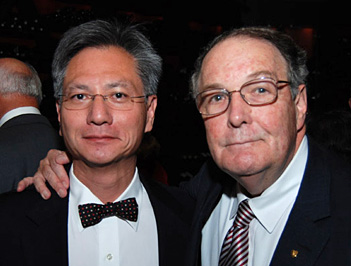Researchers Discover Key to How Common Cancer Drug
Causes Heart Failure

Dr. Edward T.H. Yeh and Dr. James T. Willerson
October 29, 2012 (HOUSTON, TEXAS) - Researchers at The Texas Heart Institute (THI) at St. Luke’s Episcopal Hospital (SLEH) and the University of Texas M.D. Anderson Cancer Center have demonstrated a genetic link that may prevent damage to the heart from one of the most common cancer chemotherapy drugs, according to a paper being published in the prestigious journal, Nature Medicine.
The discovery provides a new approach to identifying patients who can safely tolerate the drug and for developing potential new drugs, say researchers.
Doxorubicin is a widely used treatment for some forms of cancer and is associated with cardiotoxicity, which affects cardiomyocytes (heart muscle cells) and often leads to progressive heart failure in patients treated with the drug.
The research team showed that by eliminating a specific protein, Topoisomerase IIβ (Top2b), in the cardiomyocytes of laboratory mice treated with the drug, the mice were protected from the cardiotoxic side-effect.
The research suggests that Top2b is the molecular basis for triggering the drug’s effect on cancer patients, said Dr. Edward T.H. Yeh, who is the Robert and Janice McNair Foundation Scholar at THI and Chair of the Cardiology Department at M.D. Anderson.
“This is, obviously, a significant finding and one that holds potential to develop a blood test to predict patient’s sensitivity to this drug to completely eliminate this dreaded side-effect,” said Dr. Yeh.
The investigative team, led by Dr. Yeh, included researchers from THI, M.D. Anderson, the Shanghai Jiao Tong University School of Medicine and the Robert Wood Johnson Medical School in New Jersey.
“It is not commonly recognized by the public that heart disease often affects cancer patients,” added Dr. James T. Willerson, THI’s President and Medical Director. “This is one of a number of key areas to which our research is targeted and one of our most important collaborations – between cardiovascular and cancer medicine. We are highly encouraged by the work of Dr. Yeh and his team.”
For media inquiries please contact:
Director of Public Affairs
Texas Heart Institute at St. Luke's Episcopal Hospital
Frank Michel ♦ 832-355-9510 ♦ fmichel@texasheart.org
For THI and St. Luke's media profiles, see Public Affairs.



